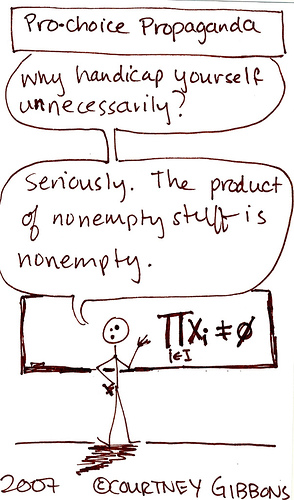Mastermath: Set Theory (spring 2013)
Exam
The exam dates are
- Resit: Tuesday 25 June,
16h00 - 19h00, VU room
MF-G613
And here are the results.
- Tuesday 4 June,
14h00 - 17h00, VU room WN-Q105.
And here are the results.
After I marked the papers I concluded that the exam may have been too
long. Almost nobody got to the last problem, therefore I decided to discard
that problem and change the formula for the grade to (total+9)/9.
One student would have gotten a higher grade under the original rules
and s/he was awarded that higher grade.
I will not hand these grades in yet; I will wait till after the retake
with that.
Old exams and sample questions
Note: the exams below cover the course as taught in 2011, which put more
emphasis on large cardinals (Mahlo, weakly compact) and the Axiom of Choice.
Here are some comments
on the last homework.
Program

- Week 15: The
Singular Cardinals Problem
(Notes)
- We do the proof of Theorem 24.18 and, if time permits, an overview
of the proof of Theorem 24.33.
- Week 14: The
Singular Cardinals Problem
(Notes)
- We start to work on pcf theory; proof of Theorems 24.8.
Theorem 24.8 holds without the strong limit assumption (with
a much longer proof), see Theorem 2.26 in the
chapter on cardinal arithmetic by Abraham and Magidor
in the Handbook of Set Theory.
Here is a
paper by Kojman and Shelah where the cofinal sequence
of length $\aleph_{\omega+1}$ in $\prod_{n\in\omega}\aleph_n$ is
used to construct a normal space whose product with the interval
$[0,1]$ is not normal.
Note: if $M\prec H(\theta)$ is countable and $S\in M$ is stationary
then $\delta_M\in S$ is not necessarily true: by elementarity there
are stationary $S,T\in M$ that are disjoint, so $\delta_M\notin S$
or $\delta_M\notin T$.
What is true is that given a stationary $S$ there are many $M$
such that $\delta_M\in S$, but this requires an extra argument.
Homework: (7.3, 7.4, 7.5, these count as one );
24.1, 24.3, 24.6 and 24.13.
Hand in in Week 15.
- Week 13: Stationary sets
and The
Singular Cardinals Problem
(Notes)
- Silver's Theorem and its extension,
the Galvin-Hajnal Theorem.
This book,
Introduction to Cardinal Arithmetic, may be useful.
- Week 12:
The Axiom of Regularity and
Models of Set Theory (Notes)
- After a very short introduction to Model Theory we dealt with
structures for the language of Set Theory.
One non-standard interpretation: $\langle\mathbb{Z},{ < }\rangle$.
This one satisfies the union axiom, but not the pairing axiom.
The main focus was on structures where $\in$ interprets itself.
We saw that $\Delta_0$-formulas are absolute for transitive sets and
we used $V_\omega$, $V_{\omega+\omega}$, $V_\kappa$ ($\kappa$ inaccessible)
and $H(\kappa)$ (for various $\kappa$) to see that certain axioms cannot
be derived from others.
The last hour was devoted to elementary substructures of $H(\kappa)$.
More on elementarity can be found via
this page.
Homework:
9.9 (see page 117), 9.12 (insert `almost' before `disjoint'),
12.6; Check whether the Axiom of Regularity and the Power Set Axiom
hold in $\langle\mathbb{Z},{ < }\rangle$; prove the Pressing-down and
$\Delta$-system lemmas for $\omega_1$ using elementary substructures
of suitable $H(\kappa)$, that is: for a regressive function on $\omega_1$
and for a sequence $\langle x_\alpha:\alpha < \omega_1\rangle$ of finite
subsets of $\omega_1$ respectively.
Hand in in week 13 (that's May 7).
- Week 11: Combinatorial
set theory and
The Axiom of Regularity
(Notes)
- An application of the $\Delta$-system lemma: the topological product
$\omega^\kappa$ satisfies the countable chain condition.
Almost disjoint families: three examples of almost disjoint families
on $\omega$, each of cardinality $2^{\aleph_0}$.
There are almost disjoint families of cardinality $\kappa^+$ on $\kappa$
(if $\kappa$ is regular) but not necessarily of cardinality $2^\kappa$.
A discussion of Kurepa trees and Kurepa families and the consequences
of their non-existence.
Back to the Axiom of Regularity: the cumulative hierarchy
$\langle V_\alpha:\alpha\in\mathrm{Ord}\rangle$ and its use in a
set-theoretically sound definition of `isomorphism type'.
As to last week's homework: te hint to problem 8.5 is not quite correct.
The best statement to prove by induction on $\alpha$ is:
``For every $\gamma\in\omega_1$ there is a closed (in $\omega_1$)
set $A$ such that $A\subseteq S$ and the order type of $A$ is $\alpha+1$.''
In the hint, for limit $\alpha$, first take an increasing sequence
$\langle\alpha_n:n < \omega\rangle$ with limit $\alpha$.
Apply the inductive hypothesis to find closed sets $A(n,\xi)$
($n\in\omega$, $\xi\in\omega_1$) such that $A(n,\xi)$ has type $\alpha_n+1$
and $\max A(n,\xi) < \min A(m,\eta)$ whenever $\xi < \eta$. Now follow
the hint again.
Those who want to redo their homework may do so; hand it in in week 12
(please let me know if you intend to do so).
- Week 10: Stationary sets and
Combinatorial
set theory
(Notes, these contain an
application of the $\Delta$-system lemma and some remarks about
the tree property)
- Every stationary subset of $\kappa$ can be split into $\kappa$ many
stationary sets.
Trees:
Kőnig's infinity lemma and Aronszajn trees.
The $\Delta$-system lemma.
Homework: 8.2, 8.5; 9.3, 9.5, 9.10. Hand in in week 11.
Note: In the hint to problem 8.5 one should find closed sets
of order type $\alpha+1$, rather than of type $\alpha$.
- Week 9: Combinatorial
set theory and
Stationary sets
(Notes)
- The
Erdős-Dushnik-Miller theorem.
Weakly compact cardinals.
Closed unbounded and stationary sets.
The club filter.
Fodor's Lemma (a.k.a. the Pressing-Down lemma) with the Free-set lemma
as an application.
- Week 8: Combinatorial
set theory
(Notes)
- Because this Tuesday is Erdős' 100th birthday we shall do some
combinatorial set theory this week and deal with various extensions
of the pigeon-hole
principle: the partition theorms of
Ramsey,
and Erdős-Rado.
We shall also see some limitations.
Homework: problems 5.17 (complete argument), 5.18, 5.27; 9.1 and
9.4 plus 9.13 (these count as one).
Hand in in week 9
More sources:

- Week 7:
Axiom of Choice and Cardinal Arithmetic
and
The Axiom of Regularity
(Notes)
- The possible behaviour of the Continuum Function ($\kappa\mapsto2^\kappa$)
and cardinal exponentiation ($\langle\kappa,\lambda\rangle\mapsto\kappa^\lambda$)
- Generalized Continuum Hypothesis
- Strong limit cardinals, (weakly) inaccessible cardinals
- Singular Cardinal Hypothesis
The Axiom of Regularity and the cumulative hierarchy of sets:
$\langle V_\alpha:\alpha\in\mathrm{Ord}\rangle$.
- Week 6:
Cardinal numbers and Cardinal Arithmetic and
Axiom of Choice
(Notes)
-
- Finishing up regular and singular cardinals.
- The formulation of the Axiom of Choice the Well-ordering Theorem
and Zorn's Lemma and the latter's use in some proofs in `ordinary'
mathematics.
- Two weaker versions: Countable Axiom of Choice and the
axiom of Dependent Choices.
- Some consequences, such as the converse to Exercise 2.5 and
various other proofs that (sometimes sneakily) use a bit of
Choice.
- Cardinal Arithmetic under the assumtion of AC up to and including
König's inequality (Theorem 5.10).
Homework: problems 3.5, 3.13; 5.3, 5.6 and 5.8.
Hand in in week 7.
Fun stuff: there is a band called
Axiom of Choice
and the band
Epoch of
Unlight released an album called
The Continuum Hypothesis, with a
song
of the same name.
- Week 5:
Cardinal numbers and Cardinal Arithmetic
(Notes)

-
- Definition of `the same cardinality' and a proof that
the cardinality of a set is strictly smaller than that of its power
set.
- Cantor-Bernstein Theorem;
- elementary cardinal arithmetic for cardinalities;
- definition of cardinal numbers and Hessenberg's theorem;
Hessenberg's proof can be found
here (on page 109) and Jourdain's proof is
here;
- cofinality and regular versus singular; .
- Week 4:
Well-orderings and
ordinal numbers
(Notes)
-
- Finishing up the ordinals.
- Induction and recursion;
- ordinal arithmetic with Cantor normal form
- well-founded relations
Homework: problems 2.5, 2.7, 2.8, 2.11 and 2.13.
Hand in in week 5.
- Week 3:
Well-orderings and ordinal
numbers (Notes)
- Introduction to well-ordered sets and ordinal numbers.
Main results: any two well-ordered sets are comparable and
every well-ordered set is isomorphic to an ordinal number.
- Week 2: More Axioms
(Notes)
- The axioms of power set, infinity, replacement and
regularity.
Homework: problems 1.5, 1.6, 1.7, 1.8 and 1.9.
Hand in in week 3.
Note In the spirit of the book: do not assume the
Axiom of Regularity when doing the exrcises.
- Week 1: Axioms
(Notes)
- An introduction to Set Theory with an explanation of the need for axioms.
The first four axioms (plus one): Extensionality, Existence of empty set,
Pairing, Separation, Union.
Do try exercises 1.1 and 1.2.
Here is Bernard Bolzano's
Paradoxien des Unendlichen; the bijection between the intervals $[0,5]$ and
$[0,12]$ is discussed on page 29.
Cantor's definition of `Menge' can be found via
this
link.
Here is the page
for this course at mastermath.nl.
Time and Place
Starting 5 February we meet on Tuesdays from 10:15--13:00 in room S655 at the
VU University,
De Boelelaan 1081
(except for (calendar) week 13, when we meet in M1.43,
and week 18, when there will be no class because of Koninginnedag).
Literature
We shall be using the following text:
T. Jech,
Set Theory. The Third Millenium Edition.
Some universities have access to the on-line version of this book;
check the link on the campus of your university.
If it does not work directly try clicking on `Access old Springer Link'
(just above the search box).
We also recommend the following books
- K. Kunen, Set Theory. An introduction to Independence proofs
- Y. N. Moschovakis,
Notes on Set Theory
- K. J. Devlin, The Joy of Sets.
Course in Leiden
Here is a link to a course in Set Theory
in Leiden.
It contains links to the original works of Cantor and others.
Other material
The webpage of the 2011 course is still available
K_dot_P_dot_Hart_at_TUDelft_dot_nl
Last modified: Friday 08-11-2013 at 09:19:43 (CET)


